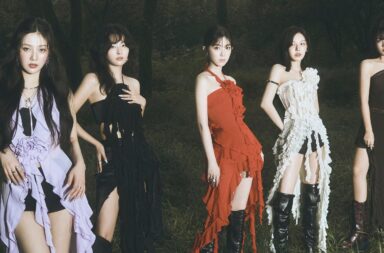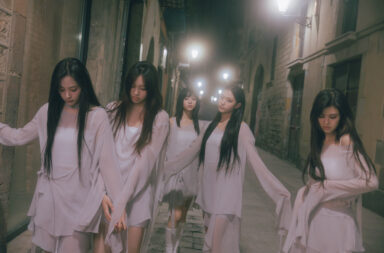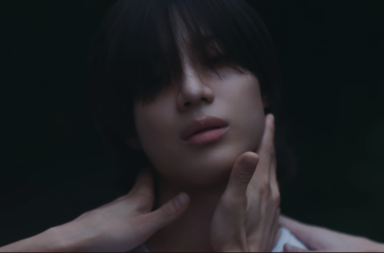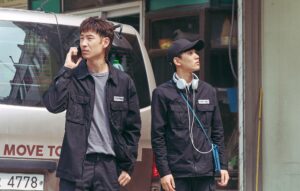
2021 was a chaotic and confusing year for the most part, but K-drama viewers were blessed with snazzy Netflix originals and dramas with all sorts of fascinating premises. Some of these achieved global prominence and others pushed the boundaries of what K-dramas could be. Aastha, Anna and Sadie discuss their top 5 picks of 2021.
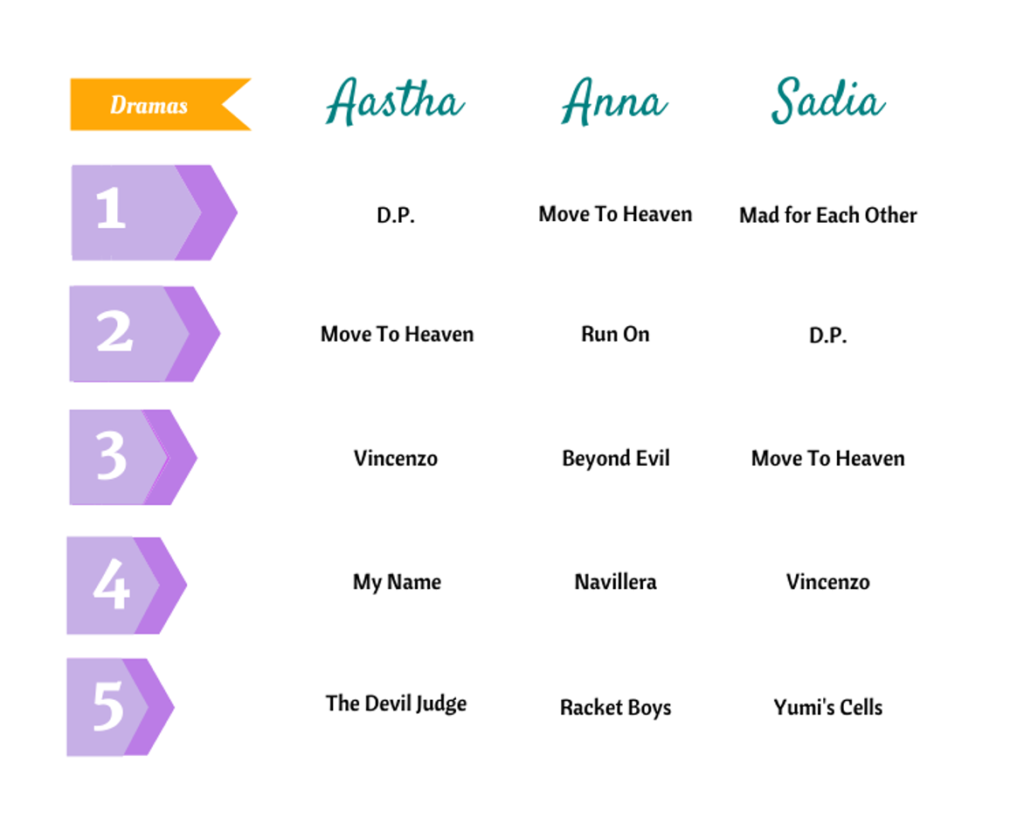
Aastha: I have to say, it wasn’t easy for me to pick my favourite dramas this year — the K-drama provisions in 2021 left watchers spoilt for choice.
Anna: It wasn’t easy for me as well — I’ve actually never watched this many dramas in a single year before, and I believe that Netflix has a part to play in enabling this. Many of the dramas we listed were either Netflix originals or available to stream on Netflix, starting with Move To Heaven, which made all three of our lists! This drama introduced me to the world of trauma cleaning and I loved its story so much that I went to purchase the book of essays “Things Left Behind” (by Kim Sae-byul) which inspired the drama. Tang Joon-sang is now a favourite young actor of mine, and I absolutely loved his relationship with his father (Jin Ji Hee) and uncle (Lee Je-hoon). What did you guys like about this drama?
Sadia: The concept of trauma cleaners was new to me too and it hit me hard. We don’t often think about our death or what will happen after — most of us live life like tomorrow is a guarantee but it’s unfortunately not. It made me think about the things I own and what any single item can tell someone about me and how I live my life. Although Move to Heaven is about death and loss, the narrative was still hopeful, delicate and full of life. It’s a drama that makes you truly root for the cast, especially Tang Joon-sang. His performance was fantastic and I found myself crying throughout my binge of the show.
Why is it your second favourite this year, Aastha?
Aastha: More than the theme of death, what moved me (ha) about Move to Heaven was the idea of the aftermath. Oftentimes, we see death as the end, but Move to Heaven beautifully displays how that is both true and not. It may be the end of someone’s journey, but we never really know the ripples one creates when they leave. And it’s not just the plot, it’s the direction, cinematography, and the acting that came together to create a near-perfect drama. It’s second on my list because every element of Move To Heaven worked in harmony to depict a story about life, death, love, grief, and so much more.
Run On was another drama available on Netflix this year! I was actually not too big of a fan, but what had it second on your list, Anna?
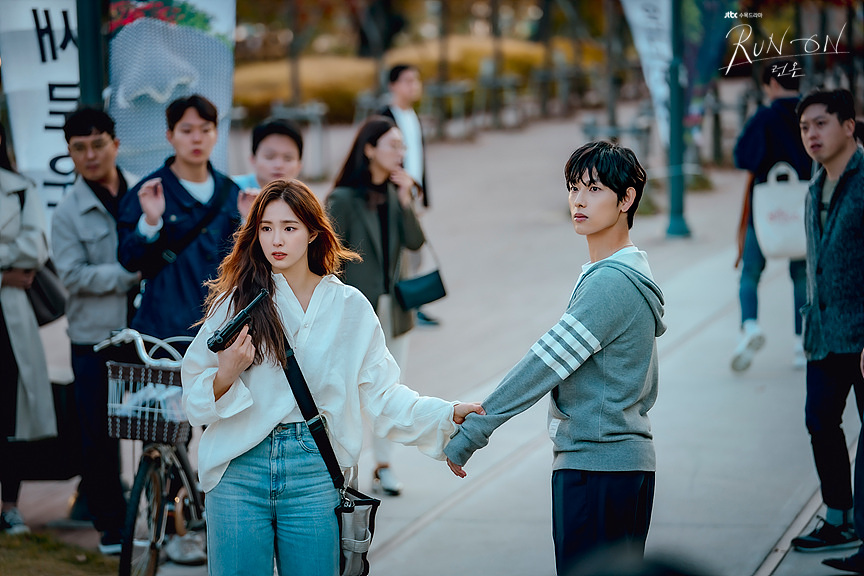
Anna: Run On was a very refreshing watch for me — it had an unconventional mix of subject matters (athletics and film translations) and uniquely lovable leads. It’s my favourite of Shin Se-kyung’s roles so far, and I loved how, through Mijoo’s job, Run On shines a spotlight on translators, who are often underrated.
Her job reflected the difficulties of interpersonal communication, especially between people who are fundamentally different beings. Im Si-wan’s Seon-gyeom was an introverted chaebol who was somehow emotionless yet extremely soft-hearted, and he pulled off this character winsomely. Their romance was made all the better by the way they slowly learned to embrace each other’s quirks and respect each other’s individuality.
D.P. is another show that breaks out of typical k-drama mould, what stood out about it for you guys?
Aastha: There is so much that D.P. does well — an excellent cast, a gripping plot, well-timed pacing, and memorable camerawork. Not to forget the haunting OST album that has been one of my most played albums this year.
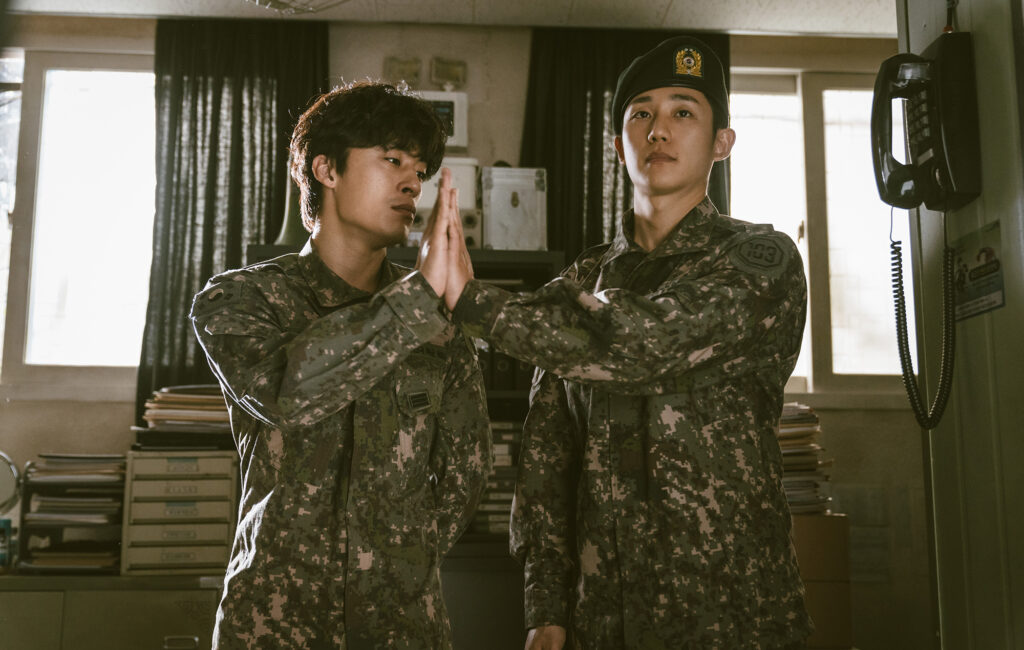
I loved that the plot didn’t shy away from making the audience uncomfortable. In countries like South Korea (and Singapore, where I stay), military conscription is not disputed much. It is what it is. And countries like these are where shows like D.P. are necessary — if serving the nation, how responsible should anyone be in ensuring the safety of those who enlist? Does military law exempt one from moral laws? Is there anyone who is really good and pure? It explores themes as such and countless others through brilliant acting, direction, and writing; the moment I finished watching it I knew that it would be one of my top few picks of dramas this year.
What drew you to D.P., Sadia?
Sadia: For me, D.P. is a harrowing introduction to military life. My ideas of the military naively come from dramas or celebrities’ experiences, so I found the drama difficult to watch at times. The fact that it draws so much from real-life events makes it even more gut-wrenching.
In a few episodes, we’re immersed in a world separate from our reality. It almost feels like we’re being let into a ‘secret’ that half of the population already knew of. D.P. is brilliant in so many ways; it’s an important drama that could be instrumental in opening the floor for long-overdue discussions on change.

I’ve been meaning to watch Beyond Evil for a while now. Why is it third on your list this year, Anna?
Anna: Beyond Evil is a complex psychological thriller like no other, and despite having very few action scenes, it is extremely gripping. The writing is tight, the OST elevates the drama to a whole new level and there are masterclass performances all around, led by the remarkable Shin Ha-kyun and Yeo Jin-goo. There was no drama this year that kept me guessing as much as this one, and no other drama left me so satisfied as we unpacked each layer of the drama. Beyond Evil picked up many Baeksang awards and it definitely deserved each one of them.
Beyond Evil explored themes of vigilante justice, but perhaps not as extensively as Vincenzo, which made it on both of your lists!
Aastha: I almost forgot to put Vincenzo on the list because it had released in the earlier half of the year, before there was an influx of more dramas from various channels and platforms. I think the balance of action, comedy, drama, and social commentary that Vincenzo had is a difficult feat to accomplish but the drama executed it incredibly well. Like The Devil Judge, it’s far from being legally accurate or precise, but what’s a legal drama without alternate depictions of legal proceedings?
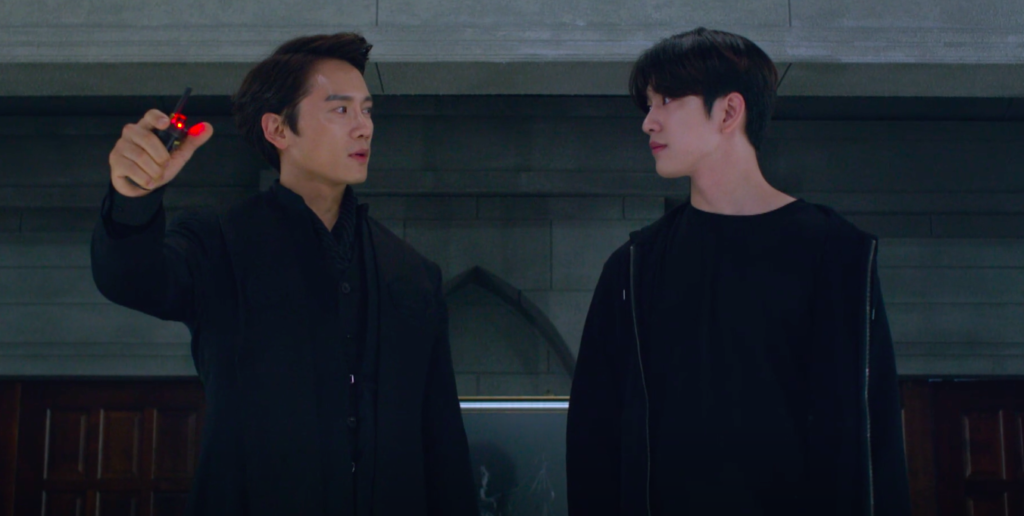
The Devil Judge pursues the idea of vigilante justice. The dystopian plot is exaggerated, a slick drama that’s angry about the power-driven, broken legal system. I do have minor quips about the drama, such as the development of some characters, but the rollercoaster of plot twists and incredible acting from the cast made it a memorable watch for me. Jisung’s portrayal of Yohan and Kim Minjung’s take on Sun-a especially deserve a shout-out.
Similarly, Vincenzo stands out — it has an intriguing plot, a charismatic anti-hero, a female lead who can stand her own ground — but the best quality is its ending. Vincenzo is one of the few dramas that really reaches a peak at its end. Vincenzo’s ruthlessness as a mafia consigliere is incomparable in the finale. Vigilante justice, in reality, is not as ideal as it seems and a lot of dramas of that theme skim over that. Vincenzo, on the other hand, drives home the consequences and the journey of trying to be a vigilante.
Sadia: The plot, the action and the cinematography of Vincenzo were next level, but I do think that the chemistry of the cast made the show even more enjoyable.
I loved Vincenzo’s relationship with the tenants of the plaza. Although Vincenzo was at the centre of it all, each character managed to slowly unfold their hidden talents and stole my heart. The tenants’ energy and fierce loyalty to their ‘mafia’ were brilliant and it made for so many laugh out loud moments. Vincenzo was witty, dramatic and action-packed and for those reasons, it made it to my list this year
I see another Netflix drama on your list, Anna. Why is Navillera in your top 5 this year?
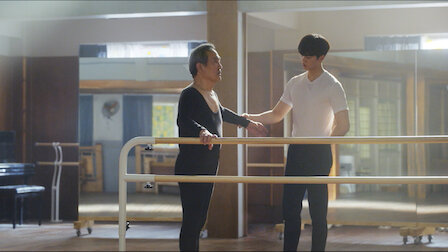
Anna: This heartwarming story about a 70-year old man learning ballet from a young ballerino drew me in instantly. I was left in tears from the second half of the drama onwards, but this drama and its endearing cast of characters nestled its way into my heart. This is my favourite of Song Kang’s work, and it was amazing to see the amount of effort he put into learning ballet. Veteran actor Park In-hwan killed it as well, and despite being 76 years old, he went through gruelling ballet training for this role. Navillera reminds us that we are never too old to pursue our dreams. If Deok-chul (Park In-hwan) can do it, what is stopping us from doing the same?
Mad for Each Other is another show with a unique premise. What made you put it at the top of your list, Sadia?
Sadia: The message of the drama resonated with me: the traumas we live through shouldn’t define us, but become reasons for our growth and empathy for others. All within thirteen 30-minute episodes, it highlights the effects of ongoing social issues like homophobia, harassment and abuse. Despite the heavy themes the drama manages to maintain a light-hearted undertone throughout the leads’ healing process.

Mad for Each Other is a romantic comedy that puts struggles with mental health issues at the centre of its plot. A suspended police officer (Jung Woo) and an ex-office worker (Oh Yeon-seo) open up about their traumas with a psychiatrist, and eventually learn to find comfort in each other. It ticked the right boxes: it’s blunt, relatable and somehow funny.
My fifth choice is also a rom-com that looks into the mechanics of the mind. Yumi’s Cells is much more light-hearted than Mad for Each Other with an ‘Inside out- esque’ drama/animation crossover. I liked the development of Yumi (Kim Go Eun) and Goo Woong’s (Ahn Bo Hyun) relationship. There isn’t anything particularly novel about it, but the fact that their simple interactions are so swoon and squeal-worthy for each of their cells makes the drama so even more entertaining and unique.
After watching the two perspectives on Yumi’s mundane life it got me thinking: Which characteristics would be most prominent for me? Without a doubt it would be hunger! (haha)
I see you’ve got My Name on your list, Aastha. What did you like about it?
Aastha: My Name is predictable, and you can see where the story will end up going even before the plot progresses to that point. Yet, it’s a drama deserving to be recognised as one of the top few this year. The acting and chemistry that the cast brought to the eight-episode series is incredible.
I put this on my list because of how formidable Han Sohee’s character was. The revenge-led themes, the grimacing action, and the noir-styled fights were amplified by her acting and the overall direction and cinematography of the show.
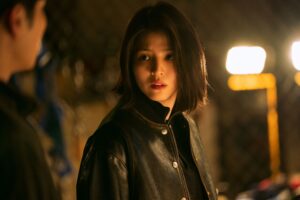
Moreover, having a female lead a role that’s usually men’s allowed for the writing to be more creative. We see a woman be emotional, and yet be rational in making decisions. We see a woman fall in love, be betrayed, and yet she continues to fight. Women are so often written as one-dimensional characters, and it was so refreshing to see Sohee and this new take on revenge. So, despite its plot predictability, I think the acting, the direction, the thematic unravelling still make it one of the best dramas.
Finally, we have Racket Boys, a drama that was quite popular! What made it memorable to you Anna?
Anna: Since this was a drama from the writer of Prison Playbook, I had high expectations for it, and Racket Boys did not disappoint. From its pitch-perfect casting of Tang Joon-sang (2021 was truly his year!) and the rest of the cast, to the heartwarming stories surrounding this underdog badminton team and the village that was always firmly on their side, I enjoyed this watch from start to finish. I especially love how each young character acted their age — they experienced heart-fluttering first love, self-esteem issues and the weight of heavy expectations. They reacted to these situations in a way that was so believable and reminded me of my younger, more awkward days.

And that’s it for our favourite dramas of 2021! The offerings of the year were truly diverse and it was a mammoth challenge to pick 5 to talk about. With more streaming platforms emerging and diverse genres being explored through K-dramas, we’re looking forward to the year ahead.
(YouTube. Images via Netflix, JTBC, tvN, SBS, KakaoTV.)
